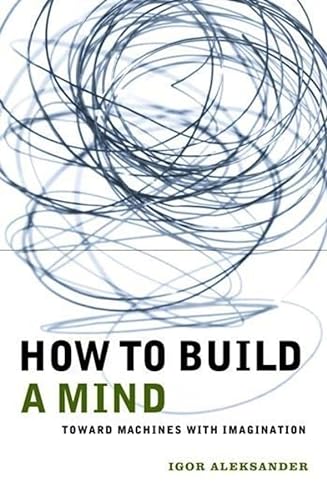
Sinopsis
Igor Aleksander heads a major British team that has applied engineering principles to the understanding of the human brain and has built several pioneering machines, culminating in MAGNUS, which he calls a machine with imagination. When he asks it (in words) to produce an image of a banana that is blue with red spots, the image appears on the screen in seconds. The idea of such an apparently imaginative, even conscious machine seems heretical and its advocates are often accused of sensationalism, arrogance, or philosophical ignorance. Part of the problem, according to Aleksander, is that consciousness remains ill-defined. Interweaving anecdotes from his own life and research with imagined dialogues between historical figures-including Descartes, Locke, Hume, Kant, Wittgenstein, Francis Crick, and Steven Pinker-Aleksander leads readers toward an understanding of consciousness. He shows not only how the latest work with artificial neural systems suggests that an artificial form of consciousness is possible but also that its design would clarify many of the puzzles surrounding the murky concept of consciousness itself. The book also looks at the presentation of "self" in robots, the learning of language, and the nature of emotion, will, instinct, and feelings.
"Sinopsis" puede pertenecer a otra edición de este libro.
Acerca del autor
Igor Aleksander is professor of neural engineering systems at the Imperial College of Science, Technology, and Medicine in London. He has studied artificial intelligence for more than thirty years and has published over 200 papers and ten books on the subject, including Reinventing Man, Impossible Minds: My Neurons, My Consciousness and Neurons and Symbols: The Stuff That Mind Is Made Of.
De la contraportada
"One of the pioneers of neural computers that borrow heavily on the brain's design" (NEW SCIENTIST) unravels the debate on replicating human consciousness
De la solapa interior
Igor Aleksander heads a major British team that has applied engineering principles to the understanding of the human brain and has built several pioneering machines, culminating in MAGNUS, which he calls a machine with imagination. When he asks it (in words) to produce an image of a banana that is blue with red spots, the image appears on the screen in seconds.
The idea of such an apparently imaginative, even conscious, machine seems heretical, and its advocates are often accused of sensationalism, arrogance, or philosophical ignorance. Part of the problem, according to Aleksander, is that consciousness remains ill defined.
Interweaving anecdotes from his own life and research with imagined dialogues between historical figures -- including Descartes, Locke, Hume, Kant, Wittgenstein, Francis Crick, and Steven Pinker -- Aleksander leads readers toward an understanding of consciousness. He shows not only how the latest work with artificial neural systems suggests that an artificial form of consciousness is possible but also that its design would clarify many of the puzzles surrounding the murky concept of consciousness itself. How to Build a Mind also examines the presentation of "self" in robots, the learning of language, and the nature of emotion, will, instinct, and feelings.
"Sobre este título" puede pertenecer a otra edición de este libro.
Otras ediciones populares con el mismo título
Resultados de la búsqueda para How to Build a Mind: Toward Machines with Imagination...
How to Build a Mind: Toward Machines with Imagination (Maps of the Mind)
Librería: Midtown Scholar Bookstore, Harrisburg, PA, Estados Unidos de America
Paperback. Condición: Very Good. Very Good - Crisp, clean, unread book with some shelfwear/edgewear, may have a remainder mark - NICE Standard-sized. Nº de ref. del artículo: M0231120133Z2
Comprar usado
Se envía dentro de Estados Unidos de America
Cantidad disponible: Más de 20 disponibles
How to Build a Mind: Toward Machines with Imagination (Maps of the Mind)
Librería: AwesomeBooks, Wallingford, Reino Unido
Paperback. Condición: Very Good. How to Build a Mind: Toward Machines with Imagination (Maps of the Mind) This book is in very good condition and will be shipped within 24 hours of ordering. The cover may have some limited signs of wear but the pages are clean, intact and the spine remains undamaged. This book has clearly been well maintained and looked after thus far. Money back guarantee if you are not satisfied. See all our books here, order more than 1 book and get discounted shipping. Nº de ref. del artículo: 7719-9780231120135
Comprar usado
Se envía de Reino Unido a Estados Unidos de America
Cantidad disponible: 2 disponibles
How to Build a Mind: Toward Machines with Imagination (Maps of the Mind)
Librería: Bahamut Media, Reading, Reino Unido
Paperback. Condición: Very Good. This book is in very good condition and will be shipped within 24 hours of ordering. The cover may have some limited signs of wear but the pages are clean, intact and the spine remains undamaged. This book has clearly been well maintained and looked after thus far. Money back guarantee if you are not satisfied. See all our books here, order more than 1 book and get discounted shipping. Nº de ref. del artículo: 6545-9780231120135
Comprar usado
Se envía de Reino Unido a Estados Unidos de America
Cantidad disponible: 1 disponibles
How to Build a Mind: Toward Machines with Imagination (Maps of the Mind)
Librería: GoldBooks, Denver, CO, Estados Unidos de America
Condición: new. Nº de ref. del artículo: 11A82_44_0231120133
Comprar nuevo
Se envía dentro de Estados Unidos de America
Cantidad disponible: 1 disponibles
How to Build a Mind: Toward Machines with Imagination (Maps of the Mind)
Librería: BennettBooksLtd, San Diego, NV, Estados Unidos de America
paperback. Condición: New. In shrink wrap. Looks like an interesting title! Nº de ref. del artículo: Q-0231120133
Comprar nuevo
Se envía dentro de Estados Unidos de America
Cantidad disponible: 1 disponibles

